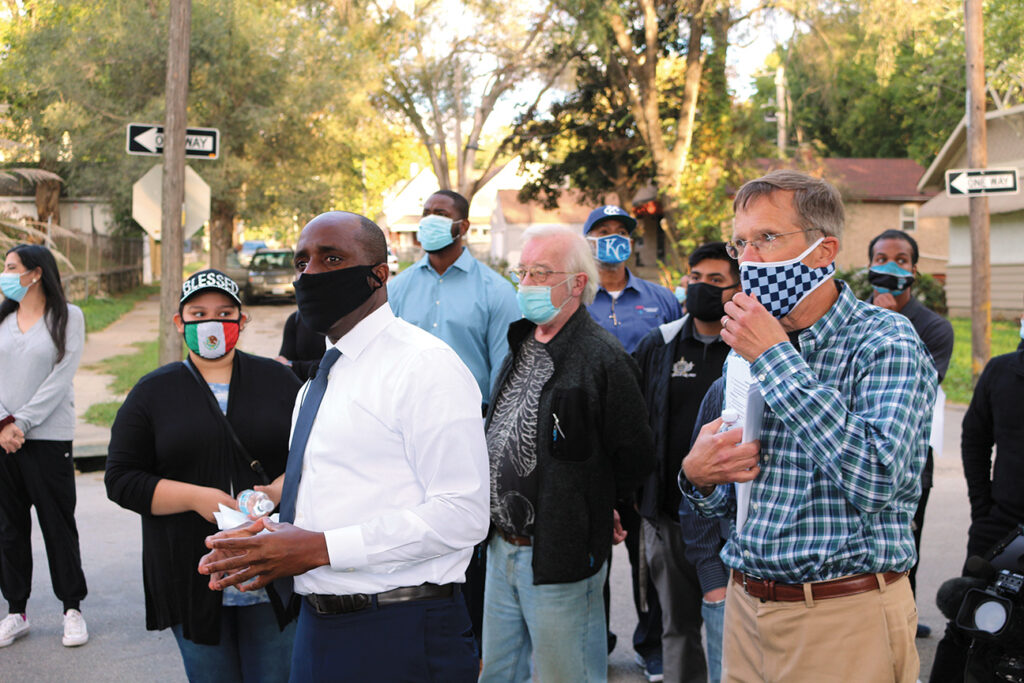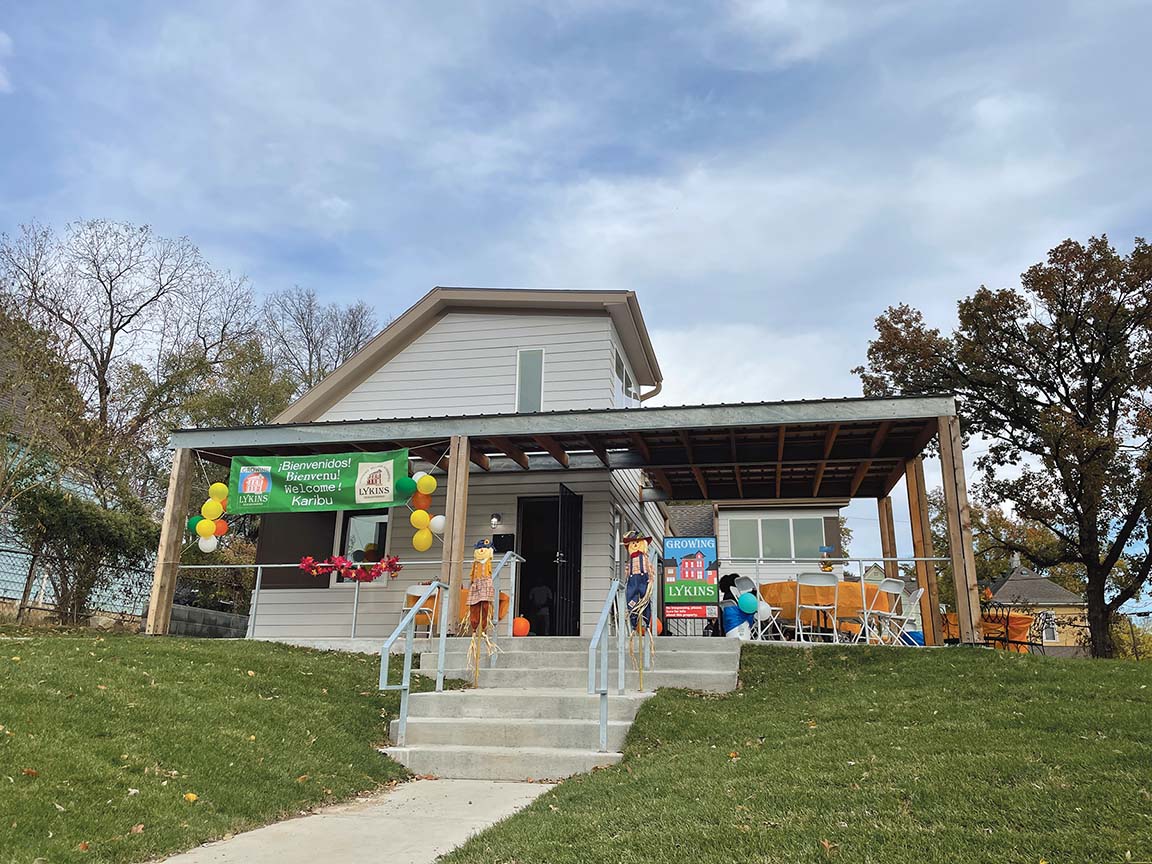
Abby Hoover
Managing Editor
Kansas City Mayor Quinton Lucas and representatives from city departments conducted a walking tour of the Lykins neighborhood on Oct. 1, led by Lykins Neighborhood Association leaders and community members.
The walk began at a home at 4401 E. 9th St., one of the houses that the neighborhood association and a professional remodeler have worked hard to remodel after falling into disrepair and attracting prostitution and drug activity.
On Sept. 30, Lucas, Kansas City Police Chief Rick Smith, Jackson County Prosecutor Jean Peters Baker and Kansas City Health Department Violence Prevention and Policy Manager Dr. Marvia Jones announced a new comprehensive framework to address Kansas City’s epidemic of violent crime.
The framework is a long-term community-based commitment that focuses on four pillars: prevention, intervention, enforcement and administrative reform. Officials yesterday announced that the framework will continue to be built with community input.
“This is the first of many community walks, town hall meetings, and public engagement opportunities to aid in its development,” according to the Mayor’s Office.
Walking west down Ninth Street and turning on Spruce, the group passed boarded-up houses – some that had been burned or condemned – overgrown yards, litter, and sidewalks in disrepair, no surprise to the neighbors who were along, nor to those familiar with Northeast.
Coral Lopez, a 19-year-old resident of the neighborhood, said she thought conditions in the neighborhood have improved over the years as more homes are being remodeled and a greater police presence exists in Lykins.
Brothers Victor and Edgar Muñiz shared a story with the mayor about Estrella De Oro Academy (Golden Star in Spanish), their youth soccer club that brings together kids from Northeast Kansas City. The coaches encourage youth to pursue higher education and teach them life skills like teamwork and determination.
Nearly 80 kids, nearly all children of immigrants, from the Northeast used to practice in Lykins Square Park with the team. That all changed when an argument started on the other side of the park and a man brandished a gun. At the next practice, only 10 kids showed up.
“All this time we’ve been living here and all that, and something we grew from the community just kind of fell apart with one incident,” Muñiz said, adding that they’re trying to rebuild the team.
Fellow coach Darrin Babson added that nobody should underestimate the power of something like soccer to have a generational change in the community.
The brothers have lived here with their family most of their lives, and one has purchased a house across the street from his childhood home.
“We see all this crime, but this is our home and we have to stay here where we can be able to live and sustain our lives in a healthy way, and this is what we can afford,” Muñiz said. “I mean, we’re working for it. All these people, we’re proud of the work that’s happening.”
The Lykins Neighborhood Association is buying part of Lykins Square Park from the city so they can implement measures to prevent crime. Though the park has been a place for homeless people and vagrants to congregate, the neighborhood association has worked to connect them to resources.
“People don’t just disappear, they have to go someplace,” Lykins Executive Director Gregg Lombardi said.
Lombardi noted that private remodelers and organizations like Habitat for Humanity have done excellent work in renovating some of the neighborhood’s worst houses, but there is still work to be done, especially on houses in near proximity to the park.
Kansas City is primed to hit a historic homicide rate in 2020, with 146 already this year. Lucas said Kansas Citians shouldn’t have to get used to the level of violence, including non-fatal shootings, the city has experienced in recent years.
“We are committed to listening, we’re committed to seeing a safer city, and we’re committed to a bottom-up approach,” Lucas said. “What I heard today was, ‘You know, we’ve already got a lot of things going, so help us with what we’re doing now.’”
Lucas said the problem with every program that they’ve ever had is that they create measures that are, in some ways, far too disconnected from things that are actually measurable and able to improve.
Lombardi hopes the conversations they had Thursday night will get the attention of city officials and gain their support so the project can move faster down the road. He also thinks it will help the residents of Lykins feel like they aren’t forgotten.
Lykins Vice President Diana Graham mentioned the cooperation the neighborhood association has had with the departments after working with them for the past two years has been a blessing.
“One of the things we are concerned about is, of course, crime, and we don’t have as many murders and stuff as other areas, but it’s here, and what affects that area affects us because we’re all citizens,” Graham said, adding that she hopes for a greater police presence.
City Planning Director Jeffrey Williams has been a great resource for the neighborhood association when planning the park redesign, figuring out what to do with an empty lot or problem solving.
“It’s a partnership,” Williams said. “It’s not about making anybody do anything, I think it’s about recognizing what people need help with and figuring out to empower them to help make the difference they want to see happen.”
Graham said the neighborhood would love to share the knowledge they have gained and their experience with other neighborhoods looking to take a proactive, collective approach. The neighborhood association has been conscious not to price longtime residents out of the neighborhood with remodels.
“We’re trying to keep it where it’s not gentrification,” Graham said. “My family has owned property since 1946, my mother still lives in that house. She’s 93, I don’t want to out-price her. It’s a fine line and we’re doing what we can.”
There are four town halls scheduled in October. They are scheduled on Wednesday, Oct. 7, at 5:30 p.m. on the topic of prevention, Monday, Oct. 12, at 5:30 p.m. on the topic of intervention, Saturday, Oct. 17, at 11 a.m. on the topic of law enforcement in the community, and Tuesday, Oct. 20, at 5:30 p.m., on the topic of reform. Location details and call-in information are forthcoming, and additional opportunities for community engagement will continue to be announced.


















